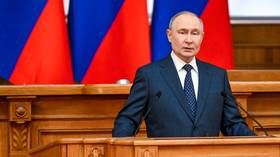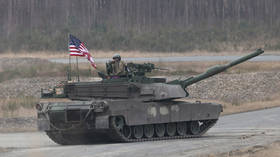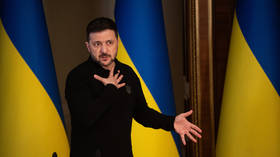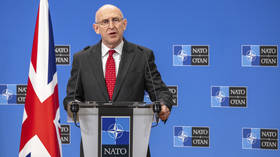US pushes to complete ‘project for military domination of entire planet’
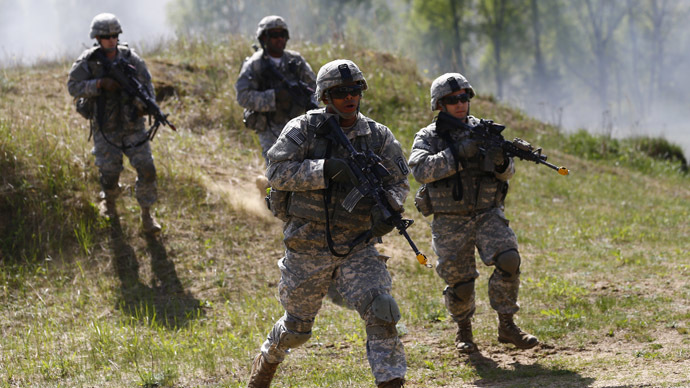
United States is doing everything to dominate the world militarily by expanding NATO into Eastern Europe and building up the Pacific Command contingents to keep China in place, political analyst and writer Rick Rozoff told RT.
RT:What do they mean by 'positioning' here exactly, after the alliance’s top military commander said NATO may station permanently additional troops in Eastern Europe?
Rick Rozoff: To complete its project for military domination of the entire planet. You know, the short and accurate answer to that question.
The US has in the post-Cold War period been developing particularly bilateral – but also many times collective – military partnerships with arguably every country in the world, with the possible exception of maybe a dozen or so. That is the US’ graduating officers from military academies in the US; the military presence and advisers; conducting military exercises in all parts of the world.
And this is something, of course, unprecedented in history where one… I’ll use the term employed by the commander-in-chief of the US Armed Forces technically, the president of the US, Barack Obama, who – this isn’t the greatest irony in history, I don’t know what is – on the occasion of receiving the Nobel Peace Prize in December 2009 referred to himself a commander-in-chief of a nation at war in two countries, but also identified his nation, the US, as being “the world’s sole military super-power.” That’s a quote.
And Secretary Of Defense, Pentagon chief, Chuck Hagel, is simply following through on that premise that the US is going to sustain and expand its military presence internationally and all parts of the world. That’s the US intention.
RT:This comes shortly after US defence minister Chuck Hagel declared, that despite budget cuts, the Pentagon is set to strengthen its military presence world-wide. Can the US afford this?
NR: Economically – no. I mean, I live in a country where many of us can’t afford even elementary healthcare, dental care, optical care; can’t afford to pay our rent. You know, having major problems – but three years ago the US spent $718 billion on the official Pentagon budget, which works out at almost $2,400 for every man, child and woman in the US.
Can we afford it? No. It the political elite in the US hell-bent on enforcing it on our population in terms of financing it and in terms, you know, around the world, in terms of deploying US military personnel and hardware. Unfortunately, that’s a political issue. It’s one that would have to be answered by the American people refusing to any longer subsidize such global military expansion.
RT:So NATO has already built-up its military might in the region. It also said it's ready to take action to protect its allies. Just what kind of dangers and action could we be talking about?
NR: You know, the US has ways of influencing people short of military bombardment, not that it’s hesitant to do that as we know. We can simply look at what’s going on in Ukraine and Syria right now where the US fighting, essentially, proxy wars. All the hot wars of the last 25 I don’t have to iterate, I suspect.
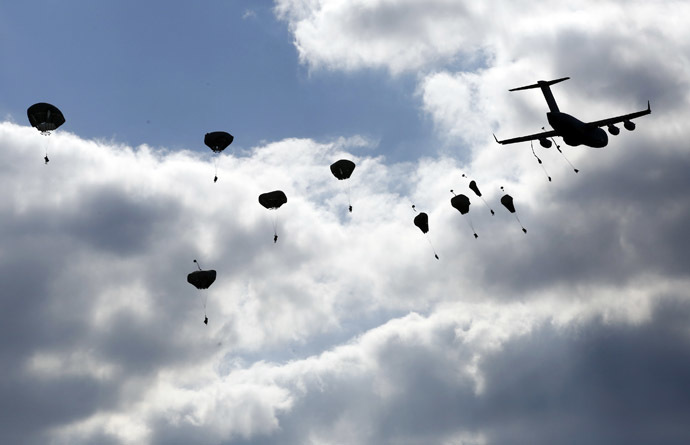
But the US is also capable of bribing, subverting and in other ways winning the approval for the US military collaboration in countries. More recently say in Myanmar, which has been one of the, perhaps, dozen countries that didn’t have a direct military partnership with the US directly and is now heading in that direction. You may recall that Pentagon chief Hagel spoke about increased US military collaboration with the Association of South-East Asian Nations, of which Myanmar is member. The other are already solidly in the US military camp, including if one can believe it, Vietnam; also Cambodia; Laos, the South-East Asian Nations member that’s for a while has been holding off, but it looks like the state department has been able to soften its opposition to the US military partnerships as it did with Vietnam and Myanmar earlier.
So again, you have a small handful of countries that manage to stay out of the US military orbit – Russia, China, Iran being the major ones.
RT:Can you elaborate more on what falls into US military orbit?
NR: Well, the Asian Pacific pivot what you referring to that was announced at the White House as well as the Pentagon two years ago, was to shift as much as 60 percent of total US naval and air-force assets to the Asian Pacific region where the Pacific Command of the US military is.
Again the US is alone in history of having carved up an entire globe into military commands, but the Pacific Command is the largest of them all. It takes the largest space. It has the largest amount of troops and military hardware assigned to it, but it is going to grow way larger. One can suspect that the reason for that is that US is comfortable in having subjugated an entire European continent, minus Russia, under NATO with NATO expansion. And similarly to have gained control of the Mediterranean base through most of Africa, related and analogous military programs. So, that the really one place to move against now is China and to do that they are stepping up the military presence in the Asian Pacific region.
RT:Can US public opinion influence the decision to deploy troops?
NR: Mr. Hagel, really sincerity does not care whatsoever what the American populace feels like anything, much less military spending and military deployments. We have a government that is not accountable to people on any important issues.
We have a corrupt, money driven political system, two party monopoly that disallows any sort of meaningful participation by citizens in the political process. That is simply incontestable. It is getting worse by the day. Political candidates, certainly for Federal Office, are vetted by the major merchants of death, if you will, by the arms manufacturers. And if they in any way or form stand in opposition to the US global military expansion, their opponents or so are handsomely funded in campaigns that they stand no chance of being elected.
The statements, views and opinions expressed in this column are solely those of the author and do not necessarily represent those of RT.



